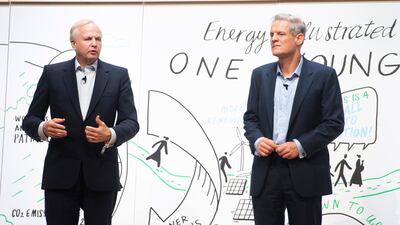Energy giant BP spends more of its capital expenditure on sustainable energy than its numbers suggest, the company's outgoing chief executive said on Wednesday.
Although BP estimates that it spent approximately 3 per cent of its capital expenditure on sustainable energy last year, chief executive Bob Dudley said that accounting presentations and standards fail to represent its efforts to reduce its carbon emissions.
BP said it spent around $500 million (Dh1.83 billion) on "clean energy" of its total $15bn to $16bn capex programme during 2018, but that same year, the company's annual profit doubled to $12.7bn and it has posted its fastest expansion in oil and gas production in decades, rising 20 per cent since 2016. Responding to claims that BP does not spend enough on green energy at the One Young World Conference in Central London on Wednesday, Mr Dudley said: "We have invested $2bn in a [solar] company here in the UK called Lightsource BP. That company has attracted now, in a year and half, $8bn of capital.
"We bring in an enormous amount of capital investment in renewables that we don't get credit for because when it is presented in an accounting way [on financials], it's a way of people saying you don't spend that."
He added he was proud of Lightsource BP and pointed out that BP has agreed to form a joint venture with US agribusiness and food company Bunge to create the second-largest biofuels company in the world.
"We may not get credit for the capital that company will spend, but it wouldn't have happened if it hadn't been for these business decisions," said Mr Dudley, who will hand over the reins as chief executive to the company's upstream director Bernard Looney next February, after a decade at the helm of BP. "I don't apologise at all for what we do, I know we're changing the world," he said.
A report released in March by InfluenceMap, a charity organisation tracking how companies affect climate change, said BP spends more than $50m a year on lobbying campaigns aimed at delaying, controlling or blocking policies to tackle climate change.
The research also showed that separately, the company donated $13m to a campaign, also supported by Chevron, that successfully stopped a carbon tax in Washington state – $1m of which was spent on social media ads.
Responding to lobbying accusations, Mr Dudley said his company was not “a giant lobbyist”.
With Mr Dudley at the summit was BP chief economist Spencer Dale, who also denied lobbying to control or defer political action on climate change.
“We are not lobbying behind the scenes saying ‘let’s carry on with this pathway over here that will be really bad for the world and really bad for us’. Don’t always look at those numbers and say that BP has some secret agenda. Why on earth would we have a secret agenda to carry on a path that is unstable, which will be bad for us?”
He said the company was going through a transition and if it did not move to adapt to climate change, it would “not flourish”.
Although BP has agreed to set objectives to reduce some of its carbon emissions and increase spending on renewables, critics say the company under Mr Dudley has done too little to reduce carbon emissions and increase investment in green energy.
Mr Dudley called for carbon pricing and said the fact that the price of carbon has not been quantified is one of the main challenges for companies when addressing the climate crisis.
"Two hundred years of history says that unless you put a price on something, you can't change behaviours," he said.
“Right now, there is not really a price on carbon. There’s got to be a united effort – you can call it ‘carbon price’ or a ‘carbon tax’ to put it on not just people that produce it but people who use it.”

